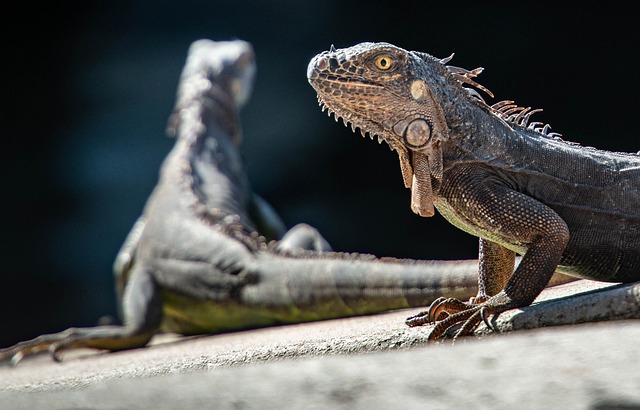Green Iguana Feeding: Best Diet for a Healthy Green Iguana


1. Overview of Green Iguana Diet
Feeding a green iguana a proper diet is crucial for its overall health and well-being. Green iguanas are herbivores, which means their diet consists mainly of plant matter. In the wild, they consume a variety of leaves, flowers, fruits, and vegetables. As a responsible iguana owner, it is important to replicate their natural diet as closely as possible in captivity.
2. Fresh Leafy Greens
Leafy greens should make up the majority of a green iguana's diet. These include collard greens, mustard greens, dandelion greens, turnip greens, and kale. These greens are rich in essential nutrients such as calcium, vitamin A, and vitamin C. It is important to provide a variety of greens to ensure a well-rounded diet.
When feeding leafy greens, it is best to offer them fresh and washed thoroughly to remove any pesticides or dirt. Chop the greens into small, bite-sized pieces to make it easier for your iguana to eat. Avoid using any dressings or seasonings, as these can be harmful to your pet.
3. Vegetables and Fruits
In addition to leafy greens, green iguanas can also consume a variety of vegetables and fruits. Some suitable vegetables include bell peppers, carrots, squash, and green beans. These vegetables provide additional vitamins and minerals to your iguana's diet.
Fruits should be offered in moderation due to their high sugar content. Suitable fruits for green iguanas include strawberries, blueberries, mangoes, and papayas. It is important to remove any seeds or pits from the fruits before feeding them to your iguana, as these can be a choking hazard.
4. Calcium and Vitamin Supplements
Green iguanas require adequate calcium for proper bone development and overall health. Calcium supplements should be provided to ensure your iguana is getting enough of this essential mineral. These supplements can be in the form of powder or liquid and should be sprinkled over their food.
Vitamin supplements, particularly vitamin D3, are also important for green iguanas. Vitamin D3 helps with the absorption of calcium. It is recommended to use a reptile-specific multivitamin supplement that contains vitamin D3. Follow the dosage instructions provided by the manufacturer.
5. Avoiding Toxic Foods
There are certain foods that are toxic to green iguanas and should be avoided at all costs. These include avocado, rhubarb, onions, and garlic. These foods can cause severe health issues and even be fatal to your iguana.
It is also important to avoid feeding your iguana any insects or animal protein. Green iguanas are strict herbivores and their digestive systems are not designed to process animal protein. Feeding them insects or meat can lead to digestive problems and nutritional imbalances.
6. Feeding Schedule and Portion Control
Establishing a feeding schedule is important to ensure your green iguana is getting the right amount of food. Young iguanas should be fed daily, while adult iguanas can be fed every other day. It is important to monitor their weight and adjust the portion sizes accordingly.
Portion control is crucial to prevent overfeeding and obesity in green iguanas. Offer a portion of food that is approximately the size of your iguana's head. This will help prevent overeating and ensure they are getting a balanced diet.
7. Hydration and Water Needs
Green iguanas require access to fresh water at all times. Provide a shallow dish of water that is large enough for your iguana to soak in. Soaking in water helps with hydration and aids in shedding for your iguana.
In addition to providing water for drinking, you can also mist your iguana with water to increase humidity levels in their enclosure. This is particularly important if you live in a dry climate.
8. Monitoring and Adjusting the Diet
It is important to monitor your green iguana's diet and make adjustments as needed. Regularly check their weight and body condition to ensure they are maintaining a healthy weight. If your iguana is losing or gaining too much weight, it may be necessary to adjust their portion sizes or the types of food they are being fed.
Observe your iguana's behavior and appetite. If they are not eating or showing signs of illness, it is important to consult a veterinarian who specializes in reptiles. They can provide guidance on the best course of action to ensure your iguana's health.
9. Conclusion
Feeding a green iguana a proper diet is essential for their overall health and well-being. A diet consisting of fresh leafy greens, vegetables, and fruits, along with calcium and vitamin supplements, will help ensure your iguana receives the necessary nutrients for a healthy life. Avoiding toxic foods, establishing a feeding schedule, and monitoring their diet are all important aspects of green iguana feeding. By providing a balanced and nutritious diet, you can help your green iguana thrive.


Related posts